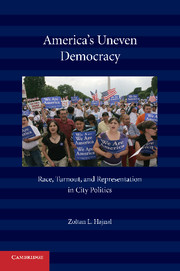Book contents
- Frontmatter
- Contents
- Acknowledgments
- America's Uneven Democracy
- Introduction
- 1 Where Turnout Should Matter
- 2 Turnout Could Matter at the Local Level
- 3 Winners and Losers in Mayoral Elections
- 4 Turnout and Representation on City Councils
- 5 Turnout and Local Government Spending Priorities
- 6 Raising Voter Turnout
- 7 The Broader Implications of Uneven Turnout
- Appendix
- Bibliography
- Index
7 - The Broader Implications of Uneven Turnout
Published online by Cambridge University Press: 05 June 2012
- Frontmatter
- Contents
- Acknowledgments
- America's Uneven Democracy
- Introduction
- 1 Where Turnout Should Matter
- 2 Turnout Could Matter at the Local Level
- 3 Winners and Losers in Mayoral Elections
- 4 Turnout and Representation on City Councils
- 5 Turnout and Local Government Spending Priorities
- 6 Raising Voter Turnout
- 7 The Broader Implications of Uneven Turnout
- Appendix
- Bibliography
- Index
Summary
This book has shown that who wins and who loses in local democracy is shaped in no small part by who votes. If the participation of each of America's racial and ethnic groups were even, we would likely see outcomes that diverged sharply from what we see today. Change would perhaps be most dramatic in mayoral elections, in which up to a third of the elections I examined could have ended with a different winner had turnout been even. But the analysis presented here suggests that city council representation could also be transformed by expanded turnout. If we could greatly increase turnout, we might eliminate almost one-quarter of the underrepresentation of Latinos and Asian Americans on city councils across the country. Finally, there is evidence that turnout is closely linked to the policies that governments pursue. Municipalities with higher turnout spend more on welfare and other redistributive programs favored by minorities and less on areas favored by more advantaged white interests.
One implication of this set of findings is obvious: in one context in American democracy, voter turnout matters. At the local level, turnout affects who wins the mayoralty, who occupies the city council, and where local governments spend their money. Turnout is, in short, central to any discussion of local democracy. Many will argue that we already know this and that the importance of turnout is readily visible in almost every political arena. But that is not what empirical studies of the American electorate tend to say.
- Type
- Chapter
- Information
- America's Uneven DemocracyRace, Turnout, and Representation in City Politics, pp. 175 - 192Publisher: Cambridge University PressPrint publication year: 2009



